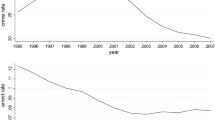Abstract
This paper presents an empirical analysis of the factors affecting bribe taking by public officials. Factors influencing the acceptance of bribes include: the probability of being convicted, severity of punishment, government salary relative to private sector income, the demonstration effect, and the unemployment rate. Our results indicate that higher probability of being convicted discourages the acceptance of bribes as does more severe punishment. Low relative earnings, high unemployment, and the demonstration effect of aggregate advertising all lead to increased bribe taking.
Similar content being viewed by others
References
Appelbaum, E., and Katz, E. (1986). Transfer seeking and avoidance: On the full social costs of rent-seeking. Public Choice 48: 175–181.
Appelbaum, E., and Katz, E. (1987). Seeking rents by setting rents: The political economy of rent-seeking. Economic Journal 97: 685–699.
Becker, G.S. (1968). Crime and punishment: An economic approach. Journal of Political Economy 76: 169–217.
Cadot, O. (1987). Corruption as a gamble. Journal of Public Economics 33: 223–244.
Dallard, R.J. (1988). Rent-seeking with non-identical players. Public Choice 57: 3–14.
Davis, M.L. (1988). Time and punishment: An intertemporal model of crime. Journal of Political Economy 96: 383–390.
Goldberg, I., and Nold, F.C. (1980). Does reporting deter burglars? — An empirical analysis of risk and return in crime. Review of Economics and Statistics 62: 424–431.
Hillman, A.L., and Katz, E. (1987). Hierarchical structure and the social costs of bribes and transfers. Journal of Public Economics 34: 129–142.
Hsiao, C. (1986). Analysis of panel data. Cambridge, MA: Cambridge University Press.
Johnston, J. (1984). Econometric methods. New Delhi: McGraw-Hill International Book Co.
Leamer, E.E. (1983). Let's take the con out of econometrics. American Economic Review 73: 31–43.
Lui, F.T. (1985). An equilibrium queuing model of bribery. Journal of Political Economy 93: 760–781.
Lui, F.T. (1986). A dynamic model of corruption deterrence. Journal of Public Economics 31: 215–236.
Rose-Ackerman, S. (1975). The economics of corruption. Journal of Public Economics 4: 187–203.
Rose-Ackerman, S. (1978). Corruption: A study in political economy. New York, NY: Academic Press.
Stigler, G.J. (1970). The optimum enforcement of laws. Journal of Political Economy 78: 526–536.
Tollison, R.D. (1982). Rent-seeking: A survey. Kyklos 35: 575–602.
Tullock, G. (1988). The costs of rent-seeking: A metaphysical problem. Public Choice 57: 15–24.
U.S. Bureau of Census (annual). Statistical abstract of the U.S.
U.S. Department of Justice (1970–1980). Federal prosecutions of corrupt public officials.
U.S. Department of Justice (1986). Sourcebook of criminal justice statistics.
Witte, A.D. (1980). Estimating the economic model of crime with individual data. Quarterly Journal of Economics 94: 57–84.
Witte, A.D., and Schmidt, P. (1979). An analysis of the type of criminal activity using the logit model. Journal of Research in Crime and Delinquency 16: 164–179.
Author information
Authors and Affiliations
Additional information
The authors are solely responsible for the views expressed and any remaining errors. Oak Ridge National Laboratory does not necessarily support our conclusions.
Rights and permissions
About this article
Cite this article
Goel, R.K., Rich, D.P. On the economic incentives for taking bribes. Public Choice 61, 269–275 (1989). https://doi.org/10.1007/BF00123889
Issue Date:
DOI: https://doi.org/10.1007/BF00123889




